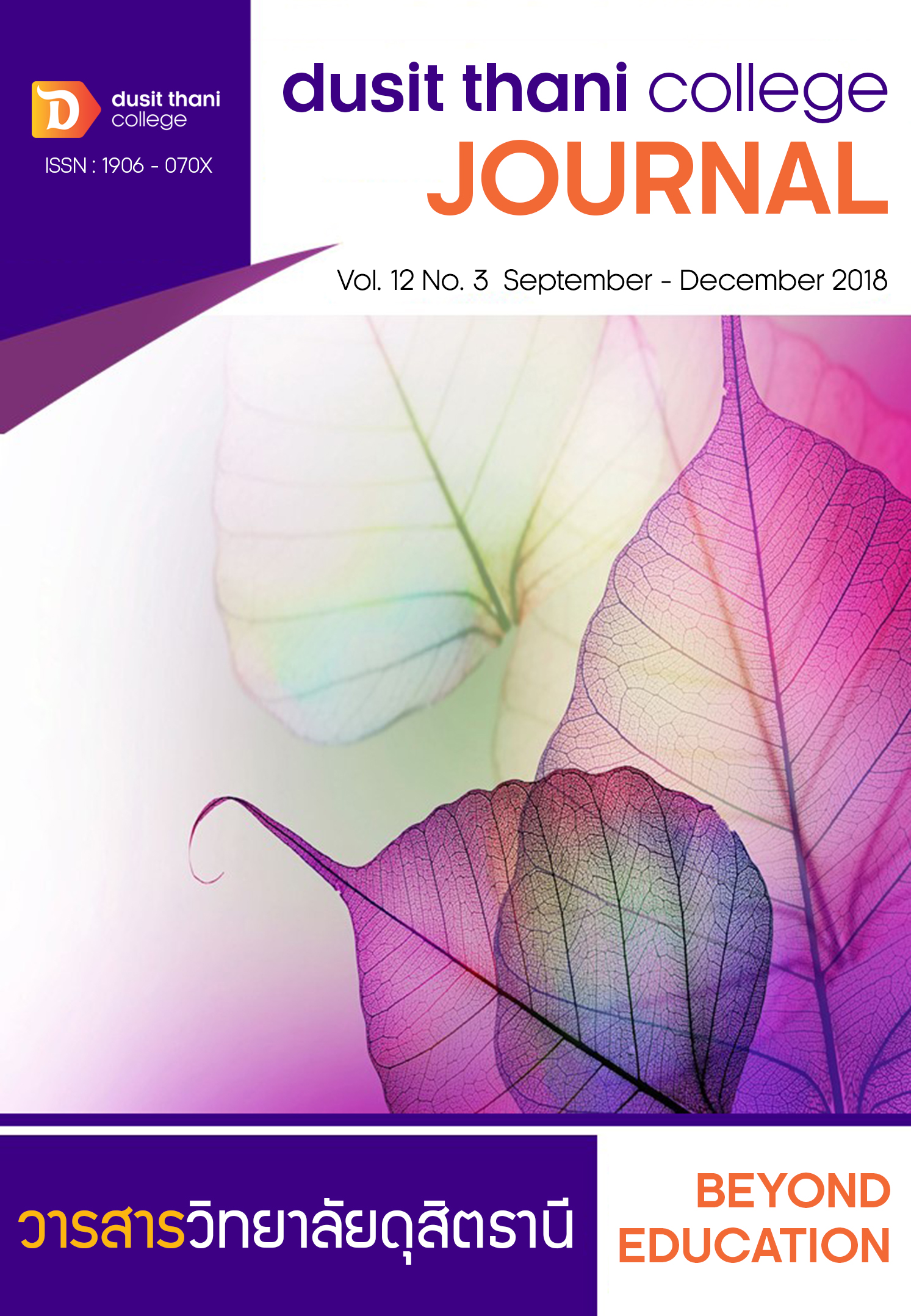Characteristics, Quality and Roles of Research on Development of Hotel Business in Thailand
Main Article Content
Abstract
This research aims 1) to study the characteristics and synthesis of research related to hotel business in Thailand and 2) to analyze and synthesize the role of research on hotel business development in Thailand. A total of 160 research full reports was devoted to hotel business during 2006 - 2016, based on the analysis and synthesis of the meta-analysis method and content analysis. The research data were collected from the research characteristics form, research quality evaluation form and research observation form. The quality of the research instruments was verified by means of content validity (IOC = 1.0) and reliability (α = 0.905). Data were analyzed and synthesized by descriptive statistics; frequency, percentage, mean and standard deviation. Including chi-square test, t-test and ANOVA.
The results show that higher education institutions play an important role in the production of research on the hotel business. While the field of hospitality and tourism also plays a lesser role in the production of research than in other disciplines, especially in the field of Business Administration or Management, Marketing and Architecture. Most of the research were in the form of dissertations researched on organizational or management issues. Management or personnel development, and marketing or consumer behavior.
The study results of the role of research in the value of research found that most researches focused on academic values and were for educational purposes rather than research for development of hotel business. The results of the evaluation of research quality as a whole. Most research had high quality. There were some major shortcomings which were caused by the lack of knowledge and research skills of the researcher, namely determining research problem without being linked to literature review. And the design of the research is not appropriate to the research topic and research objectives.
Article Details
Article Screening Policy
- All research and academic articles to be published must be considered and screened by three peer reviews in the relevant field / article.
- All articles, texts, illustrations and tables published in the journal are the personal opinions of the authors. Editors don't always have to agree. And no responsibility whatsoever is the sole responsibility of the author.
- The articles to be published must never be published. Where did you first publish? And not in the consideration of other journals If the audit found that there has been a duplicate publication It is the sole responsibility of the author.
- Any article that the reader sees as being plagiarized or impersonated without reference. Or mislead the work of the author Please let the journal editor know it will be your greatest blessing.
References
The Russell Sage Foundation.
2. Cooper, D. R. and Schindler, P. S. (2011). Business Research Methods. 11th ed. Singapore: McGraw Hill.
3. Czarl, A. and Belovecz, M. (2007). Role of Research and Development in the 21st Century. Revista Informatica Economica, 4(44), 25 – 28.
4. Glass, G.V., McGaw, B. and Smith, M.L. (1981). Meta-Analysis in Social Research. Beverly Hills : Sage Publications.
5. Jamornman, U. (1988). Analysis of attribute data. Bangkok: Funny Publishing.
6. Institution for Tourism Professional Training. (2012). ASEAN Common Competency Standards for Tourism Professionals. Ministry of Tourism and Sports.
7. Kampa, L. (2016). National 20 years Strategy and Plan 12. Office of the National Economic and Social Development.
8. Khemthong, S. (2009). Synthesis of Marketing Research on Hotel Business for the period of 2002-2007. Modern Management Journal. 7 (2), 41 – 52.
9. Kotler, P. and Keller, K. L. (2006). Marketing Management. 12th ed. North Florida:
Pearson Prentice Hall.
10. Krippendorff, K. (1980). Content Analysis: An Introduction to its Methodology.
Sage Publications, Newbury Park.
11. National Research Council of Thailand. (2012). National Research Policy and Strategy Vol.8 (2012 - 2016). Bangkok: The Agricultural Co-operative Federation of Thailand Printing.
12. Office of Education Council. (2009). Synthesis Report on Research of Thai educational quality: Meta-analysis. Bangkok: Chulalongkorn University Printing.
13. Polsarum, P. (2006). The Study of Trends for Education Research and Development for the Future. Bangkok: Office of Education Council.
14. Promsri, C. (2014). Literature Review Guidelines for Theses Graduate School.
Executive Journal. 34(1), 11 – 22.
15. Rugmai, S. (2014). Human Resource Development in Hotel Business Based on ASEAN Competencies Standard. Dusit Thani College Journal. 8(1), 195 – 213.
16. Rugmai, S. (2015). Development and Trends of Private Institution. Ph.D. thesis. Bangkok: Chulalongkorn University.
17. Sangpikul, A. (2012). An Analysis of Tourism and Hotel Studies in Thailand During the Past Decade (2000 – 2010). Bangkok: Dhurakit Pandit University.
18. Sinlarat, P. (1973). University Development in Thailand. Master’s thesis. Bangkok: Chulalongkorn University.
19. Thairath Online. (2017, August 11). Deep disclosure “Ministry of Higher Education”,
Mahidol University President speaks on the origin of Thailand 4.0. Retrieve from https://www.thairath.co.th/content/1034335. (1 December 2017).
20. Thansejtakit. (2016, March 2). In 2016, hotel business grew by 4.7-6.0 percent. It also faces many challenges. Retrieve from http://www.thansettakij.com /2016/03/02/34817. (8 August 2016).
21. The Thailand Research Fund. (2002). Research on tourism in 1986 - 2001. Bangkok: TRF.
22. Tulayawasinpong, S. (2011). Tourism Professionals Roadmap for Preparing to ASEAN Free Workers. TDRI.
23. Walker, J. R. (2009). Introduction to Hospitality. 5th ed. New Jersey: Pearson Prentice Hall.
24. Wiratchai, N. (1999). Meta-analysis. Bangkok: Chulalongkorn University.
25. Wongwanich, S. and Wiratchai, N. (2007). Guidelines for Thesis Counseling. Bangkok: Center for Innovations Textbooks and Academic Papers, Chulalongkorn University.


